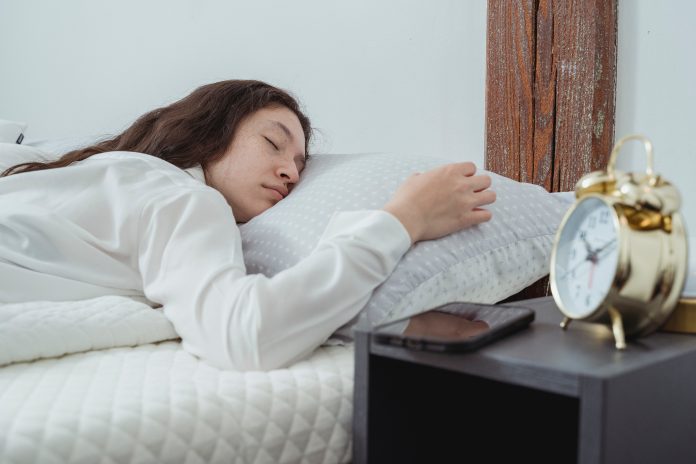Our busy modern lifestyles make it increasingly difficult to sleep well.
You can easily get enough sleep every night if you follow some proven advice, and trying out one or more of the following 8 tips is usually enough to help you get more rest.
1. Establish a Sleep-Friendly Bedroom
Make your bedroom more relaxing for better sleep. It should be dark and quiet and cool.
You should also have comfortable bedding and pillows. Block out any light that may interfere with your sleep with blackout curtains or eye masks.
Shop for Beautyrest Mattresses if you need a new mattress that provides more support and comfort than your worn and uncomfortable one.
And while you’re shopping, also get some good-quality bedding and pillows.
2. Stick to a Sleep Schedule
Your body’s internal clock regulates when you’re sleeping vs. when you’re awake. It’s simple to reset this biological clock. Just get up and go to bed based on a fixed sleep schedule.
Do this every day. This includes weekends.
3. Avoid Stimulants
Alcohol, nicotine, and caffeine interfere with sleep patterns. Avoid consuming these substances before bedtime.
Instead, opt for a warm cup of decaffeinated beverage to help you relax and prepare for sleep.
4. Adopt a Healthy Lifestyle
Did you know moderate physical activity for 30 minutes daily can benefit your overall health?
The advantages of exercise are undeniable.
Additionally, eat fruits and vegetables to improve mood. The advantages of exercise and a healthy diet are undeniable. Aim to fit in your 30 minutes of exercise earlier to get a good night’s rest.
Lace-up your sneakers and walk briskly during your lunch break or hop on your bike for a ride.
5. Relax Before Bed
Take a warm bath. Read a book. Meditate. Practice yoga.
Choose any routine that appeals to you to unwind and relax.
Avoid watching TV or using electronic devices before bedtime, as blue light can interfere with your sleep.
6. Eat Less at Night
Give your body time to digest your dinner two to three hours before bedtime. It’s sometimes difficult to fall asleep if you eat a heavy meal before bedtime.
A light meal before bed is the simple solution you need.
7. Turn Off Electronic Devices
Prioritizing our sleep by disconnecting from technology is important before hitting the hay.
Stop using WiFi devices before bed, like your cell phone, and grab the book you’ve been hiding on your nightstand instead.
If you’re struggling with limiting screen time before bed, invest in a clock radio for your bedside table.
Disrupting from technology can create a relaxing environment and reduce stimulation.
8. Reduce Noise and Distractions
Noise and other distractions can interfere with sleep, making it difficult to fall and stay asleep. Use earplugs or white noise machines to create a peaceful sleep environment.
If the distraction is due to street lights and car headlights outside your bedroom window, use blackout curtains
What to Do If Nothing Works
You should prioritize sleep in your daily routine and a healthy lifestyle.
But — what should you do if none of these effective sleep-inducing techniques don’t help you drift into a peaceful slumber?
Then, it’s time to see a sleep specialist. Some undiagnosed health conditions could be preventing you from sleeping well at night. These experts will identify the root causes of your sleep difficulties.
They can provide appropriate treatment options to help you sleep a restful night.
So, if you dread tossing and turning for hours or feel exhausted throughout the day despite getting enough sleep, see a sleep specialist.
Don’t suffer in silence any longer — consider contacting a healthcare professional for your much-needed rest.
Image by Miriam Alonso from Pexels
The editorial staff of Medical News Bulletin had no role in the preparation of this post. The views and opinions expressed in this sponsored post are those of the advertiser and do not reflect those of the Medical News Bulletin. Any Web sites linked from Medical News Bulletin site are created by organizations outside of Medical News Bulletin and are the sole responsibility of those organizations. These links are strictly provided by Medical News Bulletin as a convenience to you for additional information only. Medical News Bulletin does not approve or endorse the content on any third-party Web sites and is not responsible for the content of linked third-party sites or third-party advertisements, as well as does not make any representations regarding their content or accuracy. Your use of third-party web sites is at your own risk and subject to the terms and conditions of use as per such sites policies. Medical News Bulletin does not provide specific medical advice, diagnosis or treatment and hereby disclaims any assumption of any of the obligations, claims or liabilities..



